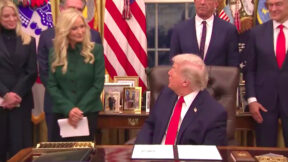Mark Levin Claims ‘Carbon Dioxide Is Not a Pollutant’ in Rant About Biden’s Greenhouse Gas Policies
Fox News host Mark Levin declared that carbon dioxide was “not a pollutant” in the opener to Sunday’s episode of Life, Liberty & Levin, offering an inaccurate and incomplete definition of greenhouse gases during a rant about President Joe Biden’s energy policies.
“I am going to prove to you in the next 10 minutes that Joe Biden and the Democrat Party are responsible for sabotaging our economy,” Levin announced to kick off the show.
He dug into his monologue, complaining about European environmentalists during the 1970s, the Green New Deal, and — playing one of his favorite tunes, a brief critique of Karl Marx and how he “hated the industrial society” — before accusing the Biden White House of supporting a “war on capitalism.”
The inflation that is currently troubling the American economy (and Democrats’ midterm election hopes) was not because of Putin or the world economy, Levin said. “It is Biden, and the Biden administration, and the Democrats who embraced every syllable of this propaganda” from Marxists and environmentalists.
The Fox News host criticized Biden policies, like revoking approval for the Keystone XL pipeline and imposing a moratorium on oil and gas leases on federal lands and waters, as showing a “willingness to use one of climate activists’ favorite tactics: blocking midstream pipelines to restrict upstream production,” in an effort “to reduce greenhouse gases.”
“Now what are greenhouse gases?” Levin asked rhetorically. “Are greenhouse gases poisonous? It sounds so ominous.”
“No,” he insisted, offering this explanation:
Greenhouse gases are in the atmosphere. You ever drive by one of these sorta glass buildings, and they create a greenhouse gas environment, so they can grow plants during the winter or during a harsh season. Those are greenhouses, right? That’s greenhouse gas.
Carbon dioxide, that’s what they focus on. The vast majority of the greenhouse gases are condensation, water. Carbon dioxide, represents — well, let me give you an example — you have a stadium of 10,000 seats? Four seats, four seats. Almost no pollution when you really think about it, as a result of carbon dioxide.
And what else? Without carbon dioxide, we die. Carbon dioxide is not a pollutant. The federal government doesn’t even have regulatory authority to regulate it. It’s not a pollutant.
What is it? It is oxygen for plants. In essence, plants use carbon dioxide to create oxygen for you and me. Remember, we used to like the Amazon, we used to like trees, we used to like all those things. Well, they suck up our carbon dioxide and push out oxygen.
For starters, Levin’s claim that the federal government no longer has the authority to regulate greenhouse gases is not accurate. Last month’s Supreme Court decision in West Virginia v. EPA struck down a specific Obama-era EPA regulation on power plant emissions (the “Clean Power Plan”), but did not eliminate the agency’s ability to regulate greenhouse gases emissions entirely. (Massachusetts v. EPA, among other cases, still stands as precedent granting the EPA authority to enact regulations in this area.)
Now, to the definitions. The Environmental Protection Agency’s (EPA) website defines greenhouse gases as simply gases that “trap heat in the atmosphere,” and lists four main types, three of which Levin neglected to mention. (It should be noted that the EPA’s definitions are not liberal talking points; Conservative Coalition for Climate Solutions, founded by former Republican congressional and think tank staffers, has posted good resources on this topic.)
In addition to carbon dioxide, greenhouse gases also include 1) nitrous oxide, which “is emitted during agricultural, land use, and industrial activities; combustion of fossil fuels and solid waste; as well as during treatment of wastewater; 2) methane, which “is emitted during the production and transport of coal, natural gas, and oil;” can “also result from livestock and other agricultural practices, land use and by the decay of organic waste in municipal solid waste landfills;” and 3) fluorinated gases, especially hydrofluorocarbons, which the EPA describes as “potent greenhouse gases,” despite being “typically emitted in smaller quantities than other greenhouse gases.”
Those types of greenhouse gases are generated not just in the natural environment but also through human-made industrial processes. Even the ones that are generated naturally — like the methane infamously expelled by flatulent cows — have a direct connection to human activity.
To be accurate, it’s cow burps, not farts, that generate a greater amount of methane, according to NASA, with additional greenhouse gases emitted from processing cow manure. A 2017 NASA climate study showed that the impact of methane emissions from livestock had been underestimated, as reported by Forbes:
Methane is a natural byproduct of digestion, made by that microbes in an animal’s gut that breakdown and ferment the food we eat. A gas, methane is a principle component of farts, though it’s not the one that makes them smell—sulfur-containing molecules are the biggest culprit there.
Farts are funny. Global warming is not. Unfortunately, methane is a big contributor to the greenhouse effect, helping to trap heat within Earth’s atmosphere and contributing to climate change. Carbon dioxide usually gets the blame for global warming, but methane is about 85 times more powerful when it comes to trapping heat, although it breaks down faster than carbon dioxide.
Even carbon dioxide, which Levin frames as natural and “not a pollutant,” also enters the atmosphere through artificial means, including treatment of solid waste, chemical processes like manufacturing cement and fertilizer, and of course from burning fossil fuels like coal, natural gas, and oil.
Levin is correct that carbon dioxide is “oxygen for plants,” and part of a normal and essential process in which it is constantly exchanged in the environment by plants, animals, and microorganisms. However, the issue isn’t all these lovely trees gently wafting oxygen down upon us, but rather the extra carbon dioxide generated by human activity since the Industrial Revolution.
Sarah Hunt, CEO and President of the Joseph Rainey Center for Public Policy and the former head of ALEC’s energy innovation project, told Mediaite that she “emphatically” disagreed with Levin’s assertion that carbon dioxide was not a pollutant.
“Cow manure is all natural and helps plants grow,” said Hunt. “But it’s also a pollutant when it’s in drinking water. The same is true of carbon, it’s useful for some applications but it’s a pollutant that causes harm when there is too much of it in the atmosphere.”
She also pointed out some specific impacts of excess carbon dioxide in the atmosphere that were being studied, mentioning there was research suggesting increased atmospheric carbon dioxide has reduced the nutritional quality of plants we use for food and increased stress hormones in plants, which can affect humans who eat those plants.
“The Biden administration’s incoherent energy policies are concerning for reasons that have nothing to do with climate change,” Hunt concluded. “It’s an irresponsible red herring to suggest climate policy is the cause for our current domestic energy challenges.”
Mediate reached out to Fox News for comment but did not receive a response.
Watch the video above, via Fox News.
[Disclosure: The author of this article previously did consulting work for the Rainey Center.]
New: The Mediaite One-Sheet "Newsletter of Newsletters"
Your daily summary and analysis of what the many, many media newsletters are saying and reporting. Subscribe now!






Comments
↓ Scroll down for comments ↓